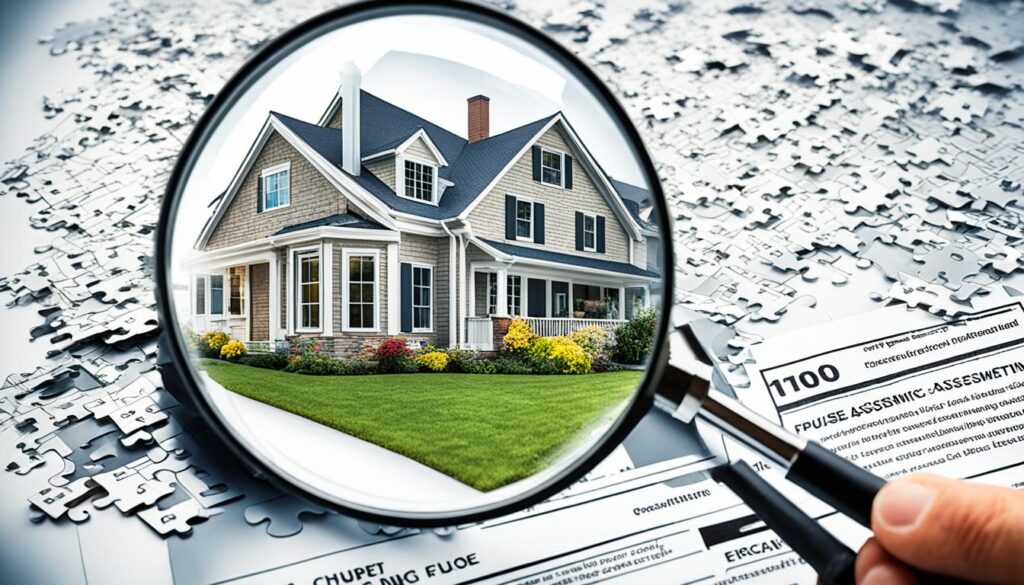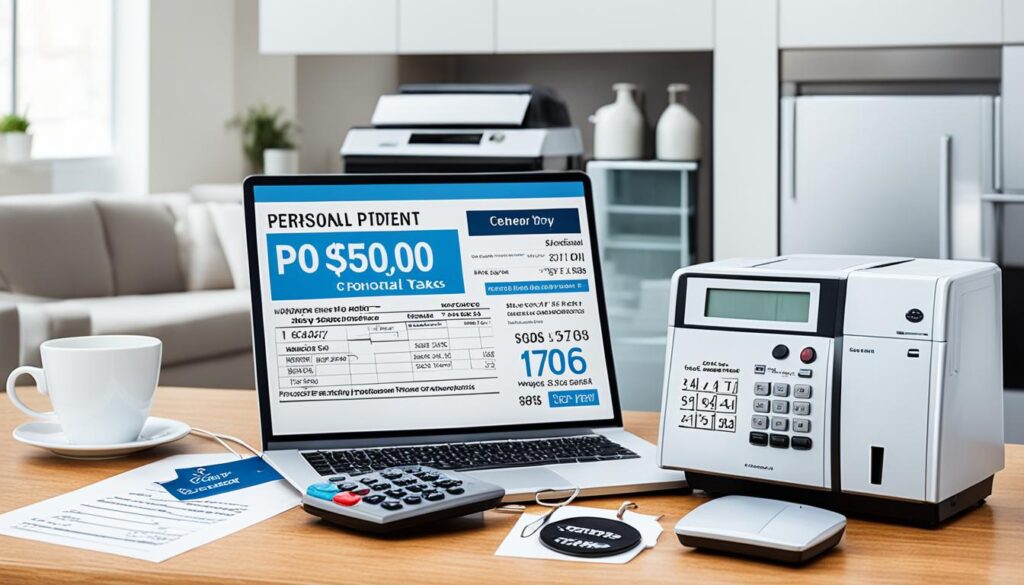Real estate taxes, or real property taxes, are charges on most homes in America. They’re paid to local and state governments. These funds help support services like schools and fire departments. Knowing how real estate taxes work is key to owning property successfully.
Key Takeaways:
- Real estate taxes are paid to state and local governments and fund local and state services.
- Understanding real estate taxes is crucial for successful property ownership.
- Real estate taxes are also known as real property taxes.
- Property owners are responsible for paying real estate taxes.
- Real estate taxes vary based on the location and value of the property.
Types of Property Taxes
Property taxes have different types you should know about. Knowing these types can help you better understand your real estate and the taxes you have to pay.
Real Property Taxes
Real estate taxes are what we pay on homes, land, and condos. They are calculated based on the value of the property. States and local governments collect these to fund schools, parks, and more.
These taxes are important because they help our communities. They pay for services like schools, police, and taking care of our roads. The amount you pay depends on where your property is and its value.
Personal Property Taxes
On the other hand, personal property taxes apply to items like cars and boats. It’s about things you can move from one place to another.
Different areas have their own rules for these taxes. How much you pay is based on the value of your items or a set percentage of their worth. Be sure to know your local tax rules to avoid any trouble.
Differences and Distinctions
Knowing the difference between real and personal property taxes is key. Real property is about your buildings and land. Personal property is your mobile items, like cars. They are taxed differently.
“Understanding the different types of property taxes is essential for property owners to navigate the complexities of taxation and fulfill their obligations effectively.”
Learning about these taxes helps understand your responsibilities as a property owner. Remember, tax rules and rates can change by location. Always get advice from local tax experts to stay informed.
| Property Type | Taxable Assets | Tax Assessment Method | Tax Rates |
|---|---|---|---|
| Real Property Taxes | Homes, Condos, Land | Assessed Value | Vary by Location |
| Personal Property Taxes | Cars, Boats, Trailers, Assets | Market Value/Percentage | Vary by Jurisdiction |
Real Estate Taxes vs. Property Taxes
Real estate taxes are not the same as property taxes. It’s key to know the difference. Real estate taxes deal with the value of homes, apartments, and condos. These taxes help pay for local services like schools and roads.
Meanwhile, property taxes cover more than just homes. They include taxes on cars and business gear too. This makes property taxes look at a wider set of things than just where you live.
Real estate taxes and property taxes do have some overlap. But, property taxes are more about many kinds of assets. It’s good to know what you owe for your house and other things you have.

Real Estate Taxes vs. Property Taxes: Key Differences
| Real Estate Taxes | Property Taxes |
|---|---|
| Specifically applies to residential properties | Includes taxes on residential properties, vehicles, and business equipment |
| Based on the assessed value of the property | Varies depending on the type and value of the assets |
| Funds local government services | Funds local government services and covers a wider range of assets |
Knowing about real estate taxes and property taxes is vital. It helps you deal with owning property better. And, it ensures you pay the right taxes for your home and other items you have.
How Real Estate Taxes Work
Real estate taxes help fund local and state services. They are crucial for property owners to understand. These taxes are based on a property’s value. Here’s an overview of the process:
Determining Tax Assessment Value
The first step is to figure out the property’s tax assessment value. Generally, this is the property’s estimated selling price. This is based on what the property would sell for.
Setting the Tax Rate
Local areas decide on a tax rate for real estate. This rate is a part of the property’s value. It tells you how much tax you need to pay. Different places have different rates.
Example Calculation:
Tax Assessment Value: $300,000
Tax Rate: 1.5%
Tax Owed: $300,000 * 0.015 = $4,500
For example, a $300,000 home with a 1.5% tax rate owes $4,500 in taxes.
Pay Attention to Changes
Property owners should watch for changes in their tax assessment. Rising property values can mean higher taxes. The tax rate also affects how much tax is paid.
Appealing the Assessment
If owners think their tax assessment is too high, they can appeal. The process to appeal varies by location. It often requires showing why the value should be lower.

Knowing how real estate taxes work helps owners plan their finances better. By understanding assessment values and rates, they can figure out their taxes. They should also keep an eye out for tax changes and know they can appeal if needed.
Differences in Tax Rates
Real estate taxes differ a lot based on where the property is. Big cities like New York have much higher taxes than rural places like Oklahoma. This is because cities need more money for many things like roads and schools.
The tax on a property is often a percent of its value. So, if a house is worth a lot, the tax will be higher. This is why cities charge more in taxes. Rural areas, with cheaper homes, tax less so it’s fair.

Where your property is located really matters for taxes. Knowing about tax rates is key when buying a home. Some places have taxes that are too high for some people. Others have lower taxes, which can be easier to handle.
Taxes aren’t always the same, even in the same state. Different areas can set their own tax rates. So, within a county or state, you might find different tax costs.
To understand taxes in a certain area, talk to the local tax office or check online sources. This helps you know what to expect in taxes. Doing your homework on taxes is smart when you’re thinking about buying property.
Personal Property Taxes
Real estate isn’t the only thing that gets taxed. Personal property like cars, boats, and RVs also face taxes. These taxes depend on the item’s assessed value, just like with real estate.
But, each place may have different tax rules. Some areas might have special tax laws for personal property. Others might offer tax breaks. It’s important to know your area’s tax rules. This helps you follow the law and avoid trouble.
To help you understand, here’s a table showing the main points about personal property taxes:
| Key Points | Details |
|---|---|
| Definition | Taxes levied on movable items owned by individuals, such as cars, boats, and RVs. |
| Determination | Tax assessment based on the assessed value of the personal property. |
| Rules and Exemptions | Varies by jurisdiction; each area may have specific regulations and exemptions for personal property taxation. |
It is vital to know the rules on personal property taxes. This knowledge is key for anyone who owns items. Knowing the rules in your area helps you pay the right amount of tax and stay legal.

Who Pays Real Estate Taxes?
The ones who own the property usually pay the real estate taxes. Yet, anyone interested in the property, like renters or occupants, must check that the taxes get paid on time.
Being a property owner means you’re responsible for paying these taxes. If you don’t, you might face penalties, interest fees, or the property could be sold to settle the tax debt.
It’s crucial for owners to keep track of their tax dues and keep payments up-to-date. Doing so not only keeps them on the right side of the law. It also helps maintain vital public services.
To ensure you don’t fall behind on tax payments, regularly check your tax bills and the due dates. Learn about the payment options your local tax office offers. This way, you can prevent tax issues and help your community thrive.
Paying taxes is a big part of owning property and contributing to society. Be responsible about it.
Key Takeaways:
- Property owners are responsible for paying real estate taxes.
- Occupants or tenants should ensure that real estate taxes are being paid.
- Failure to pay real estate taxes can result in penalties, interest charges, and even the potential sale of the property.
- Fulfilling tax obligations contributes to funding essential public services.
- Review tax bills, understand payment due dates, and explore convenient payment methods to ensure responsible tax payment.
Tax Rates, Penalties, and Fees
It’s key for property owners to know about real estate tax rates, penalties, and due dates. These things greatly affect how much you owe and what happens if you’re late. We’ll look into what you need to know about these tax issues.
Tax Rates
Tax rates are set by the area your property is in. Things like the local government’s needs and your property’s value influence these rates. You should contact local tax officials or visit their site to find out your exact tax rates.
Penalties
Not paying your real estate taxes on time leads to penalties. These are meant to push people to pay on time and follow the tax rules. Penalties can include extra charges, fees for paying late, and falling behind on payments. It’s very important to pay your taxes when they’re due to avoid these extra costs.
Due Dates
Due dates for real estate taxes differ by area. Make sure you know when your taxes are due to prevent penalties. Using reminders or online tax services can help you make payments on time.
Keeping up with tax rates, due dates, and avoiding penalties is essential for managing real estate taxes well. Know your property’s tax rates, make timely payments, and use any help available to prevent extra penalties and fees.
Discounts and Exemptions
Real estate taxes can be tough, but there are ways to get help. Places like Philadelphia offer programs to help homeowners and seniors. These programs aim to ease the tax burden for those in need.
There are also help programs for certain properties and non-profits. These can cut or eliminate tax bills for those who qualify. This is meant to reduce the tax load for certain groups.
Knowing about these help programs is key. They can save you a lot of money. Making sure you pay your taxes fairly is important.
Understanding if you qualify for these programs is crucial. Learn what you need and gather the right paperwork. This can increase your chances of getting help with your taxes.
Benefits of Discounts and Exemptions
“Real estate tax breaks help those who qualify by cutting their bills. This lets them use their money for other important things. These breaks make the tax system fair for everyone.”
Cities and towns want to help their people and boost the economy. They offer help that fits different financial needs. The goal is to provide help where it’s needed most.
Remember, tax help can change depending on where you live. Always check with your local tax authorities or online for what’s available to you. This ensures you’re not missing out on any possible savings.
Taking a look at available tax relief can be very helpful. It can make paying taxes easier for you. Knowing what’s out there and how to use it can really benefit anyone paying real estate taxes.
How to Pay Real Estate Taxes
There are many ways to pay your real estate taxes. You can pay online, by mail, by phone, or in person. Each method has its own benefits, letting you choose what’s easiest for you.
1. Online Payment: Paying online is easy and secure with the Philadelphia Tax Center. Just go to their website, fill in your details, and pay. This method lets you pay anytime from home.
2. Mail Payment: To pay by mail, send a check or money order. Be sure to include any necessary forms. This method is for those who prefer not to use the internet or phone.
3. Phone Payment: Paying over the phone is quick and easy. Call the number provided and follow the steps to pay. This is great if you like talking to someone while you pay.
4. In-Person Payment: You can also pay in person at selected places. Go there to pay your bill directly to a cashier. This option allows you to get a receipt right away.
No matter how you pay, make sure to do it right and on time. By picking the method that’s most convenient, you can meet your tax responsibilities with no hassle.
Conclusion
Understanding real estate taxes is key for property owners. These taxes help pay for local services. They are vital for the community’s smooth operation. It’s crucial for owners to know about property taxes. With this knowledge, they can follow tax rules better.
Real estate tax rates change with a property’s location and value. Places with high property values tax more. Meanwhile, rural areas often have lower taxes. Before buying property, it’s wise to check the tax rates in different areas.
There are discounts and tax exemptions available for some property owners. These include help for homeowners, seniors, and certain non-profits. Using these programs can lower the cost of taxes.
It’s very important to pay real estate taxes on time. Late payments can lead to penalties. Make sure to know payment deadlines. You can pay online, by mail, by phone, or in-person. This keeps you in good shape as a property owner.
FAQ
What are real estate taxes?
Real estate taxes are paid to state and local governments by property owners. These taxes help fund local and state services. They are also called real property taxes.
What are the different types of property taxes?
There are two types of property taxes. Real property taxes are for houses and condos. Personal property taxes cover things like cars and boats.
What is the difference between real estate taxes and property taxes?
Real estate taxes are on residential properties. Property taxes cover houses and other movable items too, like cars.
How are real estate taxes calculated?
Tax rates are based on property values. Each area sets its own rate. They multiply the value by a fixed percentage.
Do real estate tax rates vary by location?
Yes, tax rates change depending on where you live. Cities often have higher rates than rural areas. The property’s value also affects the tax amount.
What are personal property taxes?
These taxes are on things you can move, like vehicles. You pay based on what the items are worth.
Who is responsible for paying real estate taxes?
Property owners must pay these taxes. But, anyone linked to the property must make sure taxes get paid too.
What are the penalties for not paying real estate taxes?
If you don’t pay, there are penalties and interest. Your property could be sold to cover the taxes.
Are there any discounts or exemptions for real estate taxes?
Yes, there are breaks for some homeowners and the elderly. Certain properties and non-profits also get exemptions.
How can I pay my real estate taxes?
You can pay online, by mail, phone, or in person. Make checks out to the correct tax office. Follow any instructions on your bill carefully.
Why is it important to understand real estate taxes?
It’s key for homeowners to know about taxes. They support local services and vary by area. Knowing about available breaks is also crucial.


















